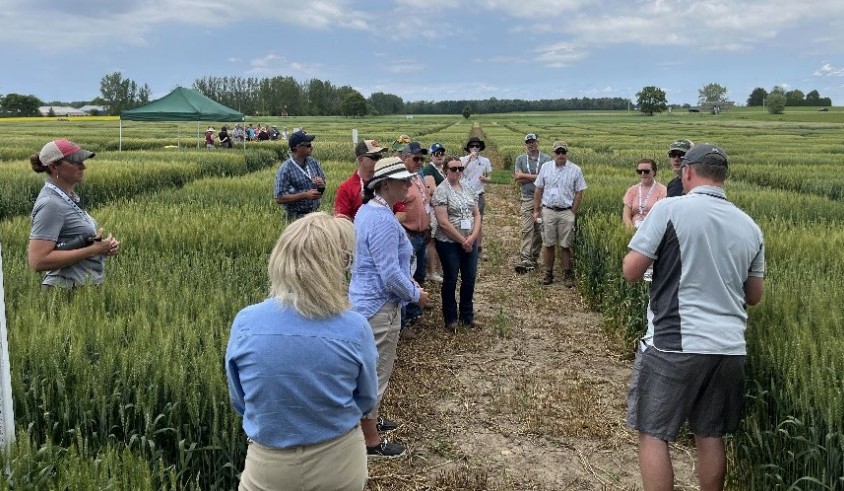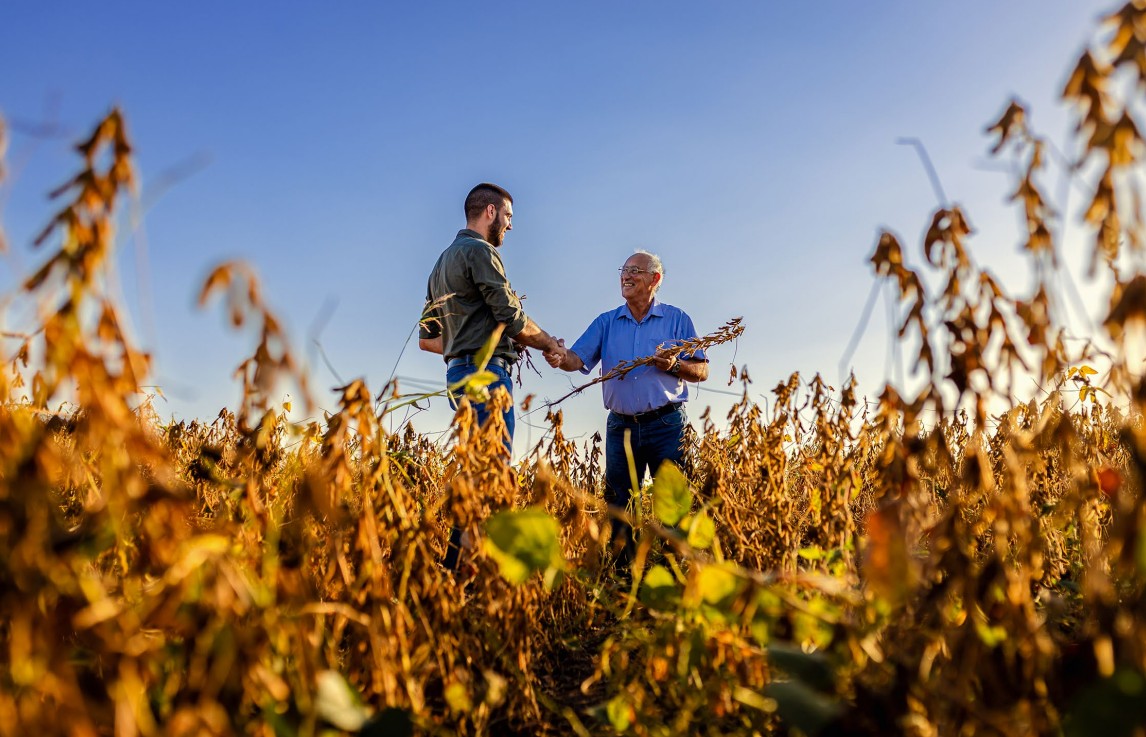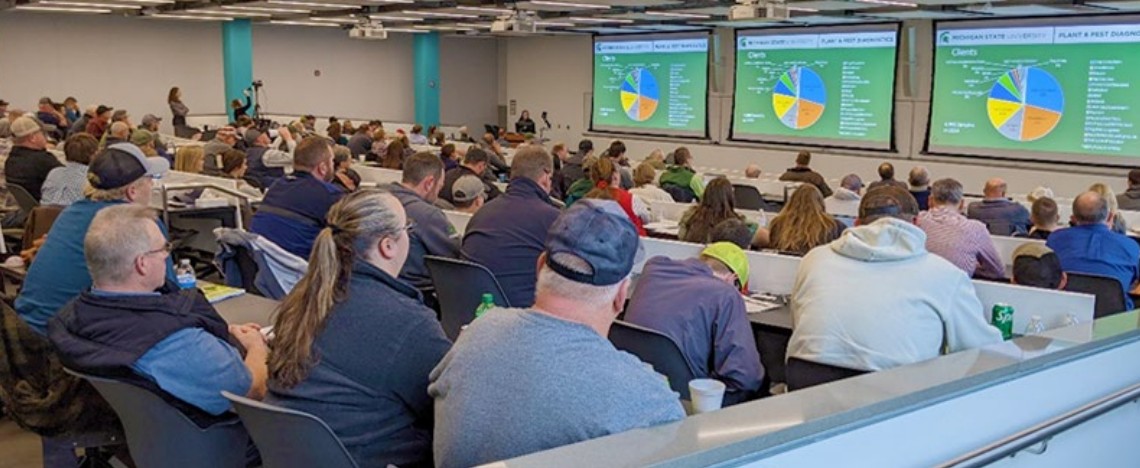
Providing Timely & Relevant Information to Field Crop Producers & Agronomists
DOWNLOADJune 24, 2025 - Michigan State University Extension
- 16,523 field crop producers and agronomists were reached through educational programs
- 3,185 one-to-one consultations were provided
- 1,234 producers and agronomists reported they improved their knowledge by participating in MSU Extension programs
Priority Areas
The following priority areas were identified by regional advisory groups composed of producers, agribusiness representatives, Michigan Farm Bureau and commodity groups:
- Cropping systems agronomy
- Nutrient management and soil health
- Farm profitability
- Pesticide resistance and integrated pest management
- Government regulation and policy
Impacts
Michigan State University (MSU) Extension has a long history of providing research-based knowledge to address the needs of field crop producers and agronomists across Michigan. Seventeen faculty specialists and 12 county-based educators are currently assigned to field crops Extension in Michigan. Faculty specialists are experts in their fields of study, conducting research and sharing recommendations based on their findings with growers. Field educators work side-by-side with producers, agribusinesses and agencies, delivering educational programming on either a regional or statewide basis. Exit surveys conducted at educational programs revealed the following combined impacts:
- 1,623,147 acres were projected to be impacted by the new information learned
- $9,396,390 was the total projected financial impact in 2024
"I have been attending this Virtual Breakfast Series from Nigeria, Africa. It has been a very educative meeting for me and has really enhanced my income as a woman farmer." Virtual Breakfast Series international participant
Virtual Breakfast Series
MSU Extension field crops educators have planned, promoted, conducted and evaluated the Field Crops Virtual Breakfast Series since its inception in 2018. Virtual Breakfast provides timely crop and pest management information to field crop producers and agronomists for 26 weeks during the growing season when important decisions are made. Participants hear weekly crop and pest updates, detailed weather updates and forecasts from an MSU climatologist, earn pesticide recertification credits, and have ample opportunity to ask questions. Producers and agronomists accessed the sessions through various channels such as participating in the live session via Zoom, listening to podcasts, viewing YouTube videos or through Facebook live. In 2024, 5,465 producers and agronomists participated in the live sessions for an average of 210 participants each week. Furthermore, 5,414 individuals viewed the YouTube recordings and another 1,493 listened to podcast recordings. The live sessions reached producers and agronomists in 14 states and 8 countries in addition to 61 Michigan counties. The financial and educational impacts of the program were evaluated through a follow-up evaluation distributed six weeks after the last weekly session of the season. There were 692 evaluations distributed with a 50.1% response rate (n=347). The 347 respondents represented 1,841,271 acres. They indicated that they planned to make changes producing a projected additional cost savings or income of $4,436,282 in 2024.
"The Virtual Breakfast is a very thoughtful and timely asset for ag professionals in Michigan. Thank you for your time and efforts in producing this program." Virtual Breakfast Series participant
Wheat On-Farm Work
Over the past four years, the MSU Extension wheat team has been working on a project with the Michigan Wheat Program and the Grain Farmers of Ontario called the Great Lakes Yield Enhancement Network, modeled off the Yield Enhancement Network (YEN) started in the United Kingdom. This program aims to help farmers improve their wheat yields. There are three components to the program: 1) a yield contest, with a goal of inspiring farmers to try new practices that improve yield, 2) a detailed benchmark report, which includes data collected from all farms, summarized and reported back to participants, and 3) networking activities for participants to share their ideas and learnings with other participants. In 2024, 186 fields participated, up from 43 in the 2021 pilot year. The program is geared up for 197 fields in 2025 and spreads across 10 states and two countries.

Field Crops Webinar Series
The Field Crops Webinar Series is an annual event that consists of eight weekly sessions conducted in February and March. Each session featured two specialists who gave interactive presentations around various topics related to field crop production agriculture. The audience is typically farmers and agribusiness professionals.
The 2024 Field Crops Webinar Series had 160 registered participants attending all eight live sessions, with a total of 826 participants across the eight sessions. Eighty percent of survey respondents indicated their knowledge increased due to the webinar series, and 217 survey respondents indicated they plan to make changes in their production. The intended changes will impact 644,541 acres and generate a projected increase in financial savings or additional revenue of $6,826,268 in 2025.
"Excellent seminar. I really like the ability to attend a meeting online. This should be a standard for future MSU events." Field Crops Webinar Series participant
"The YEN project showed us more of what our ground is capable of with proper management. From now on, we are going to be doing tissue sampling and more soil testing to push our yields from what you learned." YEN participant
Soybean On-Farm Research & Education Program
In January 2024, 350 farmers and agribusiness professionals attended six regional winter meetings where results from the 2023 Soybean On-Farm Research Trial program were shared. Of those, 123 people responded to a post-meeting survey conducted at the close of each meeting. Among the respondents, 93% (115) said they learned something useful during the program with 67% (83) indicating they intended to introduce some change to their farm or operation as a result of information learned. These intended changes were estimated to impact 35,086 acres and result in an estimated $442,042—or $12.60 per acre— in additional savings or income.
In September, 89 farmers and agribusiness professionals attended the Soybean Harvest Equipment Field Day in Lenawee County, which provided education and demonstrations for minimizing harvest losses. Twenty-six attendees responded to a post-meeting survey. All said they learned new information at the event, and seven indicated they intended to implement changes based on that information. These changes were estimated to impact 2,310 acres and result in an estimated $23,125— or $10.01 per acre—in additional savings or income. MSU Extension and the Michigan Soybean Committee cooperated to plan, conduct, analyze and summarize 61 on-farm trials with 50 farmer cooperators from across the state in 2024. Twelve projects, selected based on input from winter meeting attendees, were evaluated in the trials. The results were summarized in a 32-page research report mailed directly to more than 9,000 soybean producers and distributed at six in-person programs in 2025.
"I enjoy going to these meetings because I learn what works and what doesn't work, and I do not have to do all these tests myself." MichigaN Soybean On-Farm Research Update participant

Integrated Crop & Pest Update for Agribusiness
The annual Integrated Crop and Pest Update for Agribusiness held in December kicks off the winter meeting season for many agribusiness professionals. This timely winter meeting shares management lessons from the year before and considerations for the year ahead. In 2024, 135 participants attended in-person and 183 participants attended virtually. Participants represented 43 out of Michigan’s 83 counties. Based on evaluation results from 240 respondents:
- 3,078, 351 acres of agricultural land reported as being managed or directly impacted by participants
- 61% of participants indicated their knowledge increased because of the meeting
- 49% of participants will make management changes based on the information presented
- Over 270,000 acres are likely to be impacted by changes made in 2025.
- $2,001,145 is estimated to be the total value of increased management in 2025
Meeting attendees were also asked if they attended the 2023 meeting and what changes they implemented for the 2024 season as a result of that meeting, instead of just the intended changes for the 2025 season. Of those who attended the 2023 meeting, 41% reported making management changes during the 2024 season given the information they gained during the meeting. These reported changes impacted 235,000 acres and resulted in an estimated savings or added value of over $1,590,000.
"I appreciate the virtual aspect. As an operations manager, having the options to still be in my office and attend these to increase my knowledge is always a plus." 2024 Integrated Crop and Pest Management participant
"Good flow, the topics were very informative." 2024 Integrated Crop and Pest Management participant




 Print
Print Email
Email